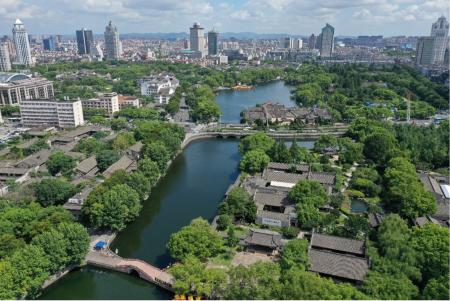
Area characterisation:
The study area (Moon Lake Park) is located in the center of Moon Lake Street, Haishu district, Ningbo City in Zhejiang Province of the People's Republic of China. Moon Lake Park covers an area of 28 hectares, with a water area of 9ha. As a small shallow lake in the city, Moon lake was seriously polluted before the intervention. It is located in the urban area, surrounded by many old neighborhoods with high land prices and large transformation costs. Moon Lake Park is owned by the local government. Furthermore, fundings for all the actions in the park will be supported by the government of Haishu district, Ningbo.
Objective:
- Disseminating the social, economic, environmental and ecological benefits of the co-design on urban infrastructures.
- Enhancing the innovation potential of local small businesses to transfer the science and technology behind the NSB to economic profits and social responsibility for human wellbeing.
Financing:
Ministry of Science and Technology of China (MSTC) with National Key Research and Development Program (2017YFE0119000)
Potential impacts/benefits:
- Improving the water environment of Moon Lake Park.
- Increase well-being of surrounding residents.
- Enhancing the image of Ningbo city.
- Increasing tourism revenue.
Actions:
- Removing sediment from the bottom of the lake to reduce pollutants and improve the water environment.
- Using the emerged macrophytes to re-nature a 5 km corridor surrounding the urban lake which will limit the runoff from non-point pollution sources in urban space.
- Collecting the integrated dataset of meteorological, hydrological, chemical and ecological parameters to develop the data-based quantitative protocols and procedures for environmental compensation.
Transferability of result:
- The methods of controlling water pollution (removing sediment and planting large aquatic plants) can be used in shallow urban lakes like Moon Lake.
- PPP (Public-Private Partnership) model is suitable for urban regeneration and environmental restoration.
Lessons learnt:
- When the nature of a NbS makes it hard to actively involve the local community in the decision-making process, transparency must be ensured, and alternative activities can be organized.
- It is important to have preliminary analysis and check-ups to ensure the successful implementation of NbS.
Client:
Urban Management Bureau of Haishu District, Ningbo
Design team:
Tianhe Aquatic Ecosystems Engineering Co.Ltd
Contacts:
Institute of Urban Environment, Chinese Academy of Sciences-Yaoyang Xu(yyxu@iue.ac.cn), Tian Ruan(truan@iue.ac.cn).